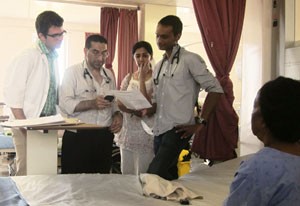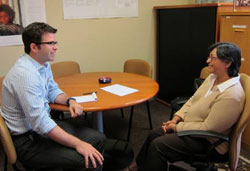Studying social networks to combat HIV in South Africa
March / April 2012 | Volume 11, Issue 2
By Steve Goldstein

Photo courtesy of Benjamin Bearnot
Fulbright-Fogarty fellow Benjamin Bearnot (at left)
said he developed as an independent scientific
thinker during his stint in South Africa.
When Benjamin Bearnot arrived in South Africa for his Fulbright-Fogarty fellowship, the New Yorker was immediately struck by the socioeconomic divide in the availability of health care. He splits his time between the urban headquarters of the Centre for the AIDS Programme of Research in South Africa (CAPRISA) and an affiliated clinic-research site in rural Vulindlela, 150 kilometers west of Durban.
"The poverty in this rural district is quite striking," he said, with approximately one in three residents thought to be infected with HIV. Bearnot's focus is on promoting HIV testing, which is critical since nearly 50 percent of individuals in Durban and the surrounding areas are unaware of their HIV status.
"One important thing I've learned in the Fulbright-Fogarty program thus far is the importance of spending a substantial amount of time interacting with members of the community," he said.
Bearnot recently was in a township called Mpophomeni in KwaZulu-Natal, helping a local organization design the HIV prevention portion of a larger life-skills curriculum for at-risk youth living in the township. This is an exciting time for HIV prevention science, with significant strides made recently in pre-exposure prophylaxis, treatment-as-prevention and gel microbicides. Bearnot is passionate about projects that translate cutting-edge laboratory and clinical trial findings into practical interventions that may change the trajectory of the HIV pandemic.
The fellowship has exceeded his expectations, he said, because CAPRISA "is at the extreme leading edge in terms of both basic science and clinical research agendas." He's been working closely with Fogarty grantee Dr. Quarraisha Abdool Karim and she's helping him develop as an independent scientific thinker. His time in South Africa has afforded new insights into the life of a clinical investigator and the balance required to work simultaneously on several projects at different stages of the scientific process.

Photo courtesy of Benjamin Bearnot
Fulbright-Fogarty fellow Benjamin Bearnot
has been working closely with Fogarty
grantee Dr. Quarraisha Abdool Karimsaid.
The fellowship, Bearnot said, "has confirmed that I would like to pursue a career as an infectious diseases clinician and physician-researcher, with a focus on disease prevention and questions of health service delivery." The rising fourth-year student at NYU's School of Medicine wants to pursue a master's degree in public health as part of his residency training in internal medicine.
One accomplishment that Bearnot speaks of with pride is creating an innovative research proposal to enroll adolescent and young adult participants into a Value-in-Prevention voucher-based initiative to harness existing social networks. It would also motivate students to access HIV counseling and testing services as a requisite entry point for HIV prevention, treatment and sexual reproductive health services. Bearnot's proposal uses chain-referral sampling - where peers help the study recruit other peers - to enable the mapping of social networks and determine if these networks contain individuals with phylogenetically-clustered HIV infections, which indicate overlapping social and sexual networks.
The experience has allowed Bearnot to meet and interact with other research fellows. "We tend to be extremely like-minded and dedicated to our work," he said, "and I hope we will be scientific collaborators and close friends for many years to come."
More Information
To view Adobe PDF files,
download current, free accessible plug-ins from Adobe's website.